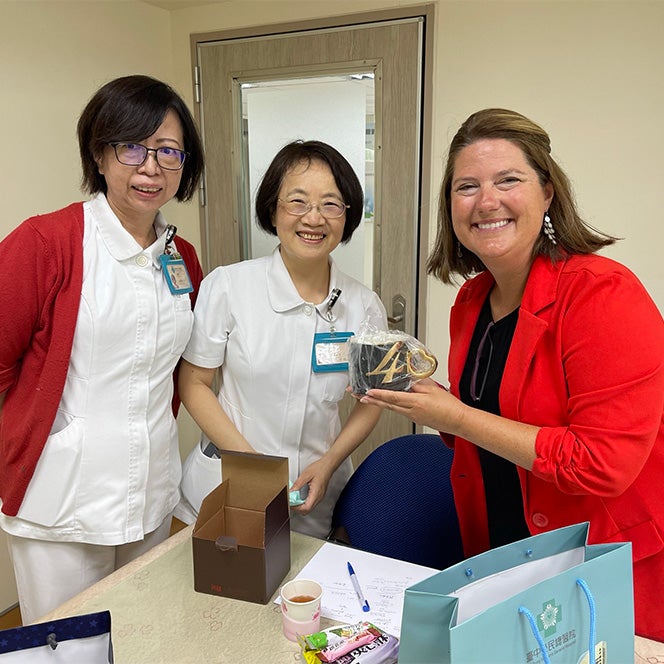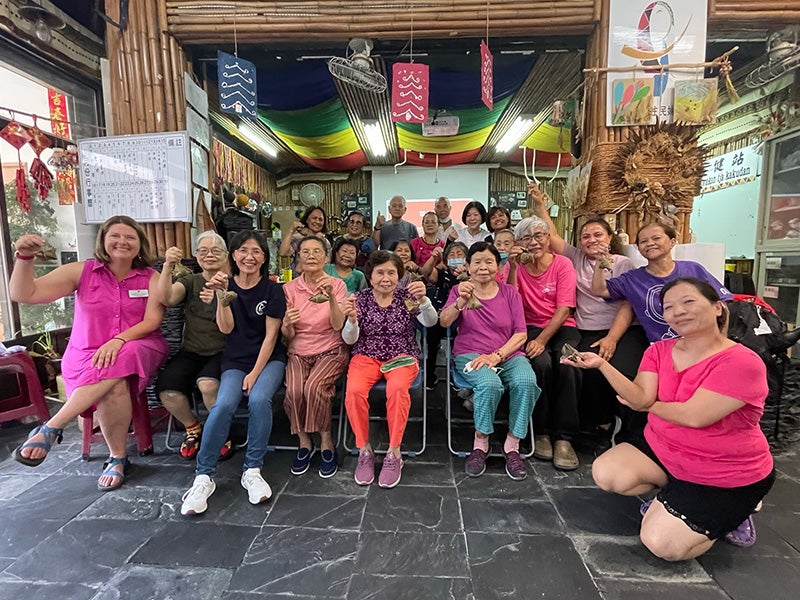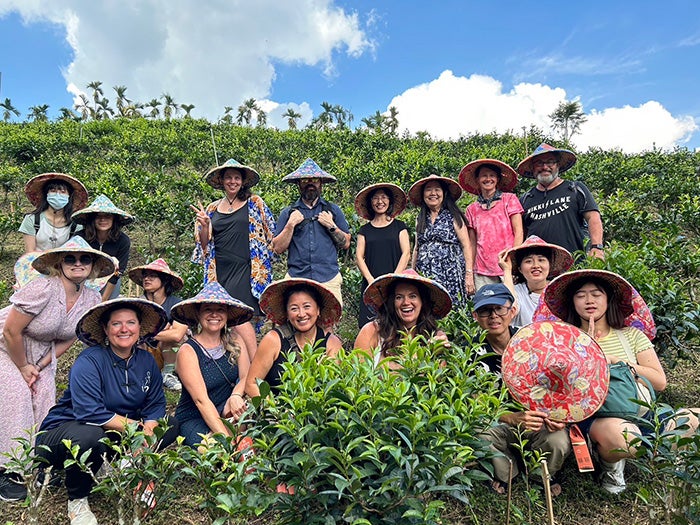Over the summer, School of Nursing clinical associate professor Renee Walters and 10 other educators from Boise State and local K-12 schools traveled to Taiwan. They immersed themselves in the culture and language as part of the Fulbright-Hays Title VI Group Project Abroad program.
Walters’ part of the project emphasized understanding cultural contexts and healthcare norms that influence how providers might interact with patients of Taiwanese descent.
Daily life during a Fulbright project
Walters and other participants immersed themselves in daily Taiwainese life. Many people begin their day with exercise in public, so Walters did, too. “People just get up, walk out and exercise in parks,” Walters said. “Aerobics classes, tai chi classes, dance classes, just stretching – it’s all in the park.”
Walters attended tai chi at 6:30 a.m. most days before catching a bus to Providence University for Mandarin classes. A significant part of the group project is developing language understanding. Walters had never studied Mandarin before arriving in Taiwan, admittedly finding it a bit intimidating.

“That was a really good experience for me,” she said. “I had a little bit of that appreciation for the difficulty and the challenges our non-English-speaking students experience, and experienced the humility that comes with not being a native speaker.”
She also toured some local healthcare systems and spoke to their leaders, educators and frontline staff about healthcare and nursing in Taiwan. This exposed her to some unique differences as well as cultural commonalities.
“The reality is nursing is nursing, everywhere; humans are humans, everywhere,” she said.
Promoting healthy aging
Walters also spent time at a senior center, one of Taiwan’s government-funded strategies to promote healthy aging and help people avoid long term care.
“One of the things that [the Taiwanese] intentionally create is this opportunity for recreation, assessment and social connectivity all at one time,” Walters said.
The centers host activities for elderly in the community and adhere to national standards for wellness. They regularly check attendees’ vitals, which Walters explained is a good way to monitor their overall health and identify any issues early on.
Activities are geared to help elderly people keep up their mobility, range of motion and fine motor skills. In exercise classes, participants practice motions to improve everyday life, like opening jars or getting up from a chair. Other activities focus on fine motor and cognitive skills, such as a craft with bead counting and sorting by color.
Even though I don’t look like a commercial…
One cultural difference that stood out to Walters is the Taiwanese value for aging seen through physical activities. Attending tai chi in the mornings, she saw people of all ages and abilities participating, even if that meant some simply clapped along or tapped their foot.

“People are willing to exercise in the park regardless of skill, regardless of mobility,” she said. “There was no shame in being out and doing the best that you could, and at all ages.”
She contrasts this cultural perspective with America’s value of trim, youthful fitness.
“[Americans] embrace people being active and fit if they look as we think active, fit people should,” she said. “Which I believe is a barrier for everyday people to say, ‘You know what? I can be a part of that, and it’s okay if I’m a part of it, even though I don’t look like a Lululemon commercial.’”
“I think that was the poignant part of it, was that it is okay to be aging, to be out and living your best you, and it doesn’t have to look like everybody else’s version,” Walters said. “It was really embracing the fact that your aged body is something that is beautiful and worth seeing, and you deserve a prominent place, and it’s going to be right here in the middle of our community.”
Turning knowledge into shared resources
Perhaps the most significant part of the experience was creating a “deliverable” that could be utilized after the trip. Team members worked with professor Patrick Lowenthal and the Center for Teaching and Learning to develop ways to share what they learned with other people.
Walters is in the process of creating a learning module that will be an open-access resource for anyone wanting to learn about the cultural context of Taiwanese healthcare. She is also creating a resource for providers who want to communicate with Mandarin-speaking patients before a translator is available.

At one point during her time in Taiwan, Walters ended up on the receiving end of care. She experienced firsthand what it is like to interact with providers who speak a different language. This gave her a new understanding of the crucial role language plays in delivering and receiving health care.
“One of our [nurses’] obligations is to always make sure that if I am communicating with a patient, that I am doing it in a language they understand,” Walters said.
Although providers have remote access to interpreters through technology, there may be a delay from the time an interpreter is needed to when they’re available. So with the help of a Mandarin teacher, Walters created a simple Mandarin language card for providers to be able to communicate on a basic level with the patient.
The card contains phrases in English and Mandarin – like “My name is…” and “Are you in pain?” – along with corresponding visuals the provider could point to while waiting for an interpreter. Walters said the goal is for providers to be able to communicate: “‘I care, and I acknowledge that your language is not mine, but I want to make sure that you’re safe and cared for,’” she said.